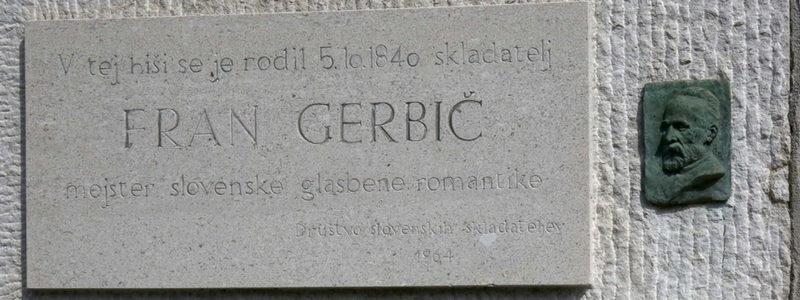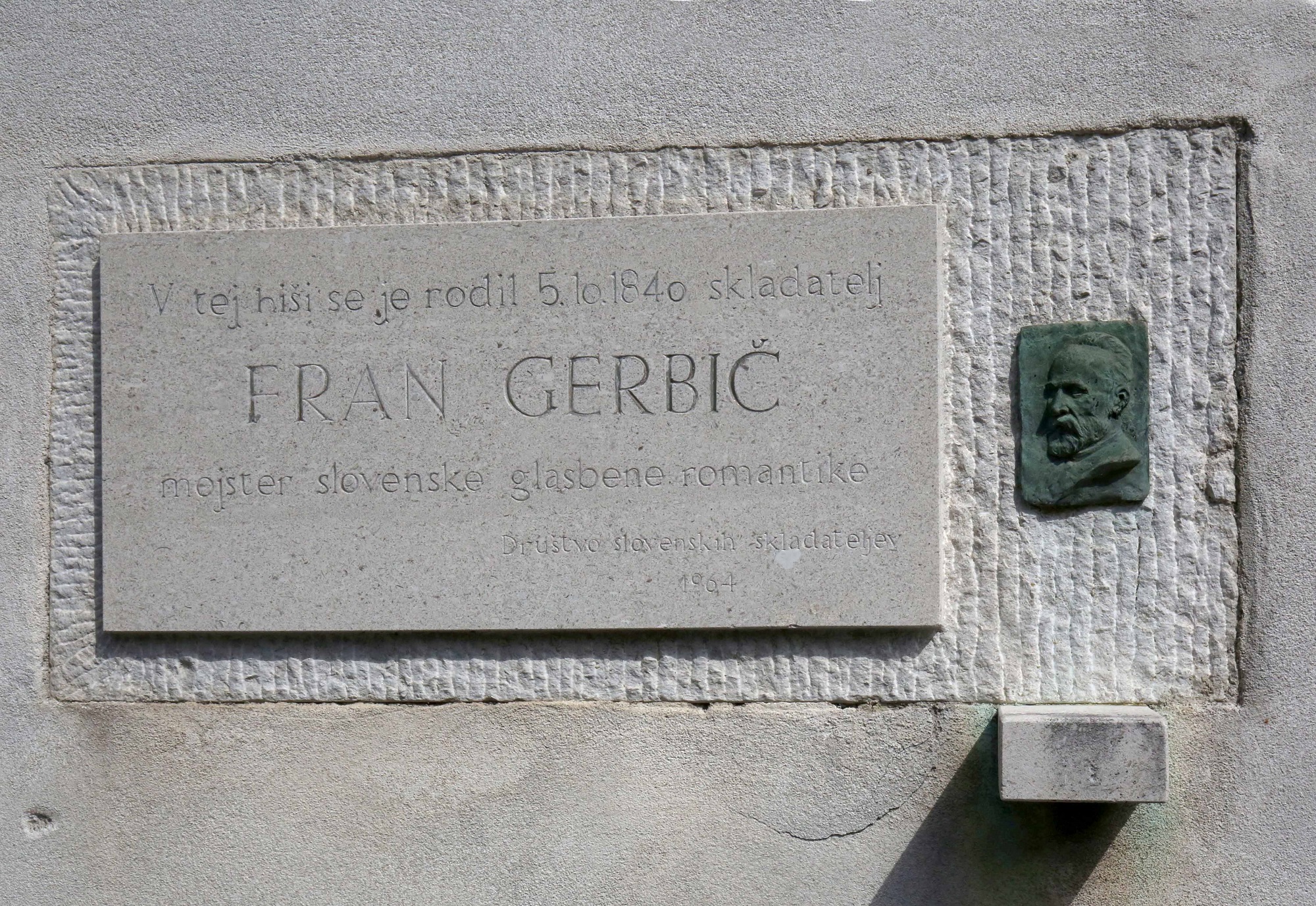A commemorative plaque was attached to the façade in 1964, when the memorial room in the birthplace of Fran Gerbič was still open.
Fran Gerbič
Fran Gerbič (1840–1917) was an influential teacher of operatic singing, a composer, publicist and theatre practitioner. He went down in musical history as the first highly educated Slovenian composer, and takes credit for writing a romantic symphony at a time when most orchestral music was at the service of entertainment and dancing. An operatic pioneer – in the 19th century, the genre was still in its infancy in Slovenia – Gerbič, alongside Viktor Parma, established Slovenian opera both as an art form and an institution. Through his pedagogical work, Gerbič was instrumental in raising the professionalism of Slovenian opera singers: it is worth mentioning that one of his female students even performed at venues as prestigious as Wagner’s Bayreuth Festival.
Gerbič first studied singing, music theory, harmony, piano and organ with Kamilo Mašek, and later on at the Philharmonic Society. Between 1865 and 1867, he studied composition at the Prague Conservatory and began to publish his early compositions; among other pieces, 71 of his canticles were published in Lira Sionska. After graduating from the Conservatory, he sang tenor at the Prague National Theatre, and later on in Zagreb, Ulm and Lemberg (now Lvov). In 1882, he suspended his opera career to become a music teacher at the conservatory in Lemberg.
In 1886, in a desire to help foster Slovenian musical life, he accepted the invitation of the Glasbena matica Music Society, the National Reading Society and Dramatic Society, and moved to Ljubljana, where he worked as an educator, choirmaster and chapel master. Being the first Slovenian music teacher to obtain an advanced education, Gerbič reformed the teaching of music in Slovenia. In 1887, he introduced the study of harmony and counterpoint into the curriculum. His Methodology of Vocal Studies was published by the Caecilian Society Ljubljana.
He is rightfully renowned for his training of singers, several of whom carved out distinguished careers, including soprano Franja Vrhunc, who was cast in Wagner’s roles at the 1901 Bayreuth Festival with great success, and mezzo-soprano Ivanka Peršl, who later on performed in Bratislava.
Gerbič dedicatedly promoted the growth and development of Slovenian operatic creativity, encouraging the production and public presentation of works by Slovenian composers. As an artistic director, Gerbič was highly influential in elevating the standards of the operatic repertoire and in refining public taste in opera music, e.g. by staging excerpts from operas by Tchaikovsky and Verdi, and later on by programming landmark opera pieces by Slovenian composers and major contemporary works by international composers, including Cavalleria rusticana by Pietro Mascagni, The Noblemen of Teharje by Benjamin Ipavec and Der Freischütz by Carl Maria von Weber.
Gerbič’s own body of musical work also provided for the establishment and continued vitality of Slovenian professional theatre. Besides the popular lieder, Kam? (Where?, 1903) and Pojdem na prejo (I’ll Watch the Girls Spinning, 1917), and choral, orchestral and vocal-orchestral works, church compositions and masses, Gerbič scored two operas, Kres (Midsummer, 1896) and Nabor (Initiation, 1913).
In terms of composition, Gerbič outshone his contemporaries in his orchestral works, pieces at the time performed mostly at balls and social gatherings. Asserting the spirit of national identity in their titles, his first orchestral works, Jugoslovanska rapsodija (Yugoslav Rhapsody, 1904) and Jugoslovanska balada št. 2 (Yugoslav Ballad No. 2, 1934), reflect the melodic influences of Slovenian folk tunes. Considered to be the first Slovenian romantic symphony with artistic tendencies, Gerbič composed his Lovska simfonija (The Hunter’s Symphony, 1915) by echoing the motifs throughout and thematically linking the movements. Aspiring to craft a monumental instrumental work of greater artistic value, the technically demanding symphony challenged the skills of instrumentalists of the time and did not receive its premiere until later.
Maia Juvanc
Anja Biščak

